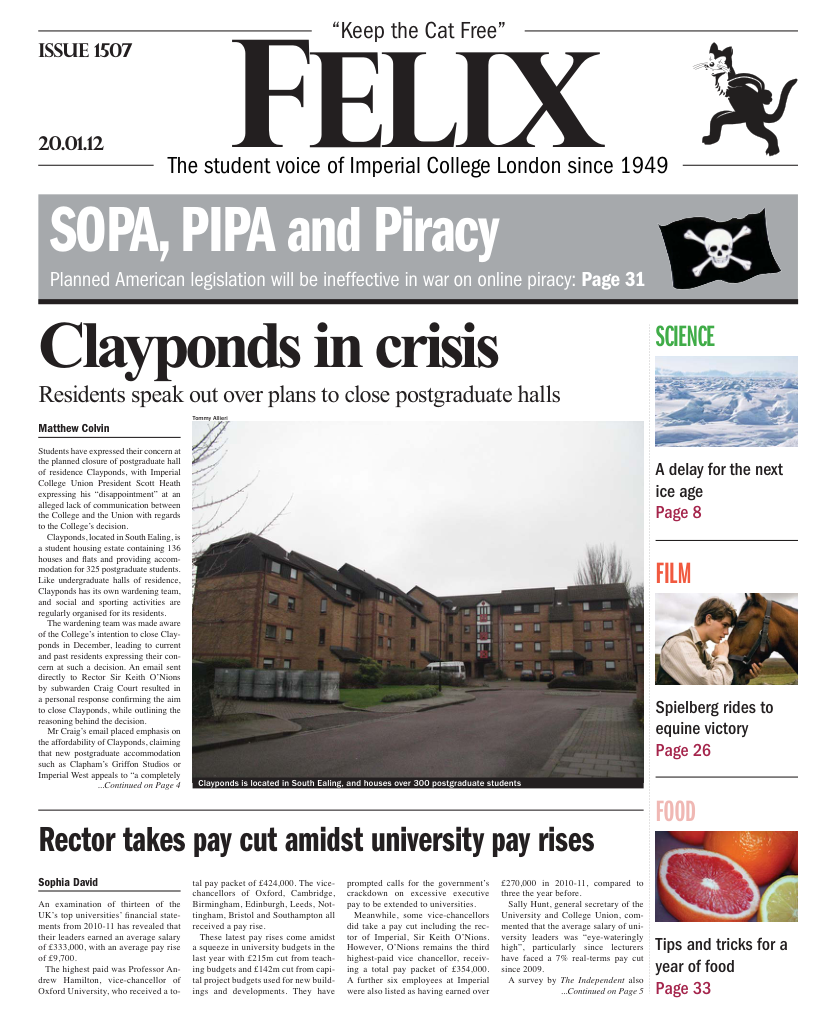Media bias just flies right by us
Tim muses on how today's print media seems to have blurred the line between news and commentary - leaving us in a bit of an opinion tug o' war

Something hit me the other day. It wasn’t a fist luckily/unfortunately (delete as appropriate based on your opinion of me). I’ll explain, I was reading a newspaper that wasn’t Felix (treason, I know, I wouldn’t recommend that anyone else EVER does this). I was just browsing the news section, as I’m an intellectual/was trying to look intellectual in the hope that a girl in a coffee shop would notice me and be enamoured. It didn’t work (damn you revision beard, you make me look unkempt – in a bad way, not like a loveable rogue), but I did manage to see something so obvious that I was surprised people are not up in arms about it. The newspaper was incredibly unsubtle in its bias. It was obvious what it wanted you to take away from the news story. It was, at times, so clear what side it was leaning towards, that it was bordering on being one giant comment section (being the Comment Editor, that would be both awesome and incredibly destructive to my degree).
On reading a news story, I actually did a double take and assumed I was being paranoid. That wasn’t possible. I said in my head, as they’re listening ALL THE TIME. I was looking too much into things, and taking some subtle slight too seriously. Maybe it says something about me that I’m doing this. Admittedly, that’s entirely possible. Luckily, I’m not the only one to notice. For example, I think we all know what the Daily Mail’s views on life are (oh, and, sorry, but reading this article gives you cancer and makes paedophilic immigrants befriend your children).
You may say I’m slow on the uptake. The thing is, I did notice this a long time ago, thought ‘meh, that’s just the way they roll’ and ignored it. Ever since then, I think I’ve trained my brain to just use vacuum filtration on the article and only collect the precipitate (or facts – jokes like that prove that I bear the scars of recent revision).
... this is the real world. It is impossible for someone to be completely unbiased... we are all human, not automatons.
If anything, obvious bias is possibly less sinister than subtle undercurrents of persuasion. Reading a story and thinking ‘yeah that’s their spin on it’ means that they’ve been a bit too heavy-handed. What they aim to do is implant an idea in your brain (Inception style, minus Leo) that you just naturally conclude from reading the article.
This leads me on to the future of the print media. I think that if there were to be a newspaper, physical and electronic, that provided factual, well-researched, un-biased news it would be something I would like to read. The idea that I could read a news story and then draw my own conclusions without someone trying to force their opinion on me is quite nice. They would, of course, have a Comment section where the newspaper could give its comment and opinion on the news. However, this would be a separate section; the news would be left to the News section and the comment to the Comment.
That’s sort of how it was meant to be. You may say that this, rather handily, gets rid of the hypocrisy of writing in a Comment section about how newspapers should have less comment. My point is really boiling down to this: in a serious paper’s News section, I expect factual reporting that tells you what’s happening. In the Comment section, I can find analysis and someone’s opinion on what’s going on. When reading a person’s opinion, it’s them saying what they think, so I’m ready for someone to give a bit of a one-sided view to support their argument. They are, after all, trying to get me to agree with what they think. That’s the point, and the beauty, of the Comment section: everyone can voice their view on a particular topic of their choosing. They can use facts to support their argument, but they are not just aiming to deliver you facts. They are, like a woman/man talking to a bisexual man that she/he fancies, trying to swing you one way rather than the other.
Another way that I think print media could survive, if it wishes to, is by becoming the gold standard. You can get your news from all the 24 hour news channels and websites nowadays. The trouble is, often a breaking story will dominate. There are many consequences of this. Firstly, you end up getting a saturation of reporting and speculation. Just remember the tragedy in Norway where it was suggested, incorrectly, that it was an Islamic terrorist attack. Secondly, it means other news stories are swept down the agenda and basically forgotten about. What I’m suggesting is that a newspaper, not having to rush to immediately push out some news, could have enough time to investigate things a bit more. A day isn’t too long, but it could help them fact-check.
Of course, this is the real world. It is impossible for someone to be completely unbiased. Why? Because of who writes the news. Humans. We are all human, not automatons. We will all, invariably, without even realising it, write something a bit biased when reporting facts. It’s impossible not to. Whether it’s consciously making it out as if an experiment has gone well when it hasn’t, or subconsciously wording something in a particular way, it’s unavoidable. I think that if a newspaper, or any news outlet, said, okay, we are not machines, so let’s put some safeguards in to ensure we are as fair as possible. Don’t ask me what these would be. I guess having a lot of people separately read it and flag anything they think is too biased. Even then it’s possible they would only tell people about stuff they don’t agree with. So I accept that you can’t eliminate bias completely, but you can keep it to a minimum.
I’ll end this by explaining why I say it flies right by us. Obviously, it was the catchiest title I could think of. Also, even if it doesn’t fly by us, we are so resigned to it that we ignore it and so how prevalent and influential it is whizzes past us; we forget that it could be affecting others. Then again, I guess I am pretty biased.








